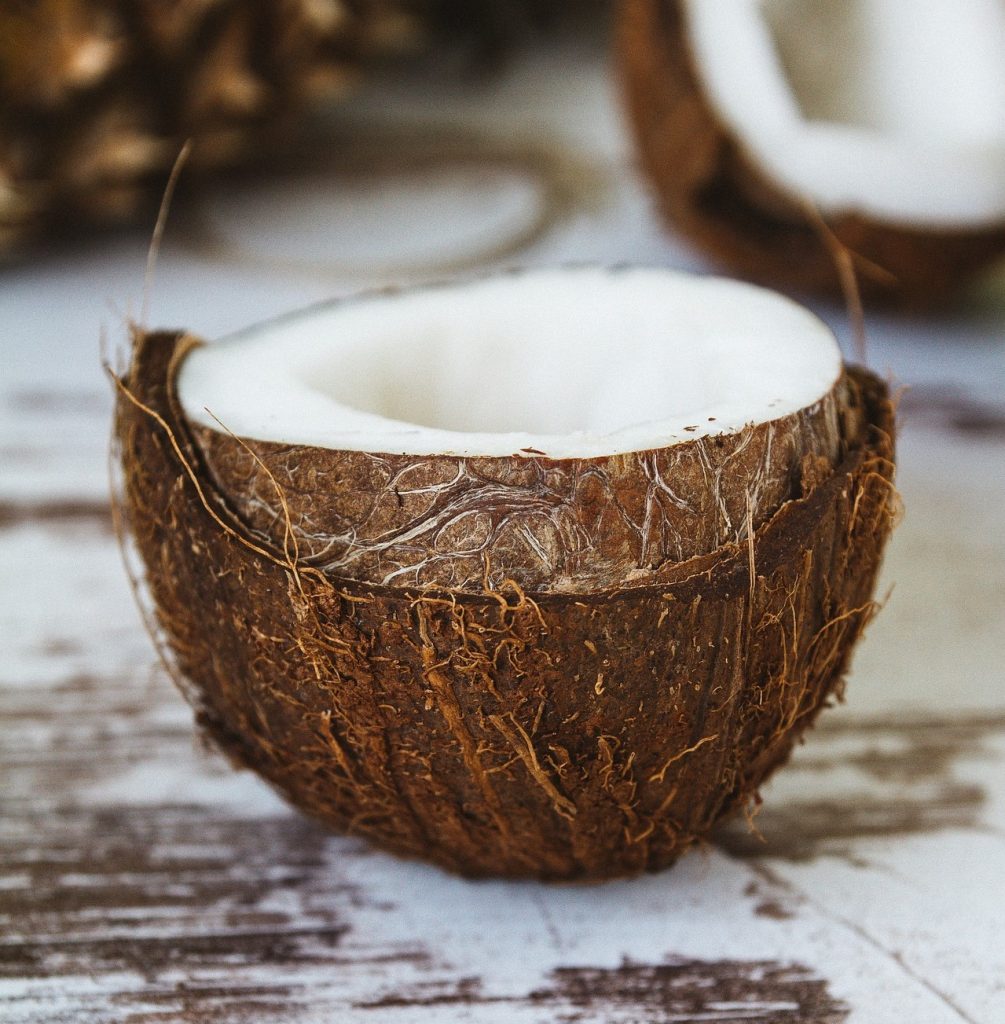Did You Know?
- Coconut meat and coconut water are good sources of potassium, magnesium, and manganese. Additionally, coconut meat is high in fiber.
- Coconut oil consists entirely of fat and provides no other nutrients.
- Coconut oil can be enjoyed in moderation, used as a substitute for saturated animal fats, and is great for cooking at high temperatures.

Understanding the Coconut Oil Controversy
Coconut oil has been touted as a miracle food by the media, weight-loss gurus, and even some in the scientific community. It has been promised to protect against cancer and Alzheimer’s disease, promote weight loss, and even treat AIDS. While coconut oil may confer some health benefits, many of the existing claims are unsubstantiated and based on very limited and/or poor research. It is important to regard these claims with a degree of skepticism until additional scientific evidence is provided.
How is Coconut Oil Different from Other Fats?
Coconut oil is comprised of predominantly saturated fat, and saturated fat has been linked to an elevation in blood cholesterol levels that can increase risk for heart disease. However, the saturated fat found in coconut oil may have different health effects than the saturated fat found in animal products. The saturated fats in coconut oil are medium chain triglycerides (MCTs), as opposed to the long-chain fatty acids found in animal fats. MCTs are transported directly to the liver, where they may be immediately used for energy instead of being stored as fat. Because the liver rapidly burns this energy for fuel, it is thought that replacing coconut oil for other fats may lead to weight loss. Yet, research supporting such claims is limited, and further investigation is needed.
While coconut oil may not be a “miracle food”, it can still be enjoyed as part of a healthy, balanced diet. Read the following list for tips on how to incorporate this food as part of a healthy diet.
Incorporating Coconut Oil into a Healthy Diet
- Use in moderation. Coconut oil can be enjoyed as part of a healthy diet. However, it is high in saturated fat and calories, so consume coconut oil in moderation in addition to other oils. Limit saturated fat intake to 10 percent or less of your total calorie intake.
- Use as an alternative to saturated animal fat. Try a teaspoon on popcorn or toast for a light snack. Replace dairy creamer with a teaspoon of coconut oil for a creamy, nutty flavor. It can also be used to replace butter or lard in high temperature baking.
- Use for cooking at high temperatures. Coconut oil has a higher smoke point than many oils and is stable at high temperatures, making it great for:
- Pan-frying or stir-frying foods
- Roasting vegetables
- Searing meat or fish
- Grilling and broiling
Balance your diet with other types of oils and fats. As with all foods, variety is key. Continue eating other sources of fat, especially those rich in mono- and polyunsaturated fats. These “good” fats have a variety of benefits, contributing to heart and neurological health.
Chicken Stir Fry with Coconut Oil
Serves
4
Serving Size: 1.5 cup
(1 cup stir fry + 1/2 cup rice)
- 1/3 c low sodium chicken stock
- 2 Tbs low sodium soy sauce
- 1 Tbs ginger (paste or fresh, minced)
- 2-3 cloves garlic, minced
- 1 tsp red pepper flakes
- 1 Tbs honey
- 2 tsp cornstarch
- 2 tsp coconut oil
- 1 lb. skinless chicken breast, 1” cubes
- 3 c stir-fry vegetables (fresh or frozen)
- 2 c cooked brown rice
- Combine chicken stock, soy sauce, honey, ginger, garlic, and red pepper in a small dish; mix with cornstarch until no lumps remain and set aside.
- Heat oil in a large skillet over medium-high heat. Add chicken; cook and stir for approximately 7 minutes or until no longer pink.
- Add vegetables and sauce. Cook an additional 3 minutes, or until heated through. Serve over brown rice.
Optional: Sprinkle with a garnish of your choice, such as green onions or chopped nuts.


